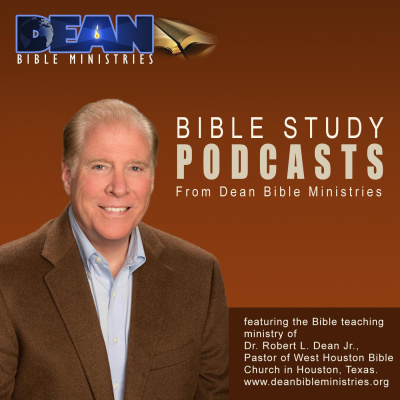Sinopsis
Romans has always been one of the favorite books of thoughtful Christians. In this epistle, the apostle Paul logically delineates the foundation and structure of Christian doctrine. The righteousness of God has been accurately identified as the central message of this epistle. How the righteousness of God relates to a human history of suffering, pain, and injustice, has been a frequent question through the ages. In Romans, Paul's answer shows that this question cannot be addressed in a sound bit
Episodios
-
83 - The Key to the Spiritual Life: The Holy Spirit [b]
13/12/2012 Duración: 01h04minWe understand that walking by means of the Spirit is not an experience or methodology. It is knowing the eternal reality that you are entirely different and operating from a radical new identity. Our world is not gray. It’s black or white, God’s way or man’s way, and because of our new identity in Christ, we have the power to make choices for a Spirit-filled life that are finely honed with time and application of the Word. The condemnation we escape through our choice of being filled by the Holy Spirit is the punishment in time caused by walking according to the flesh. The problem doesn’t morph with the culture. It remains the Sin Nature, not self esteem, addiction or emotional disorders. Paul’s contrasts are between flesh and spirit, life and death. Our tool to overcome a carnal death in time and achieve life and joy in all circumstances is the Holy Spirit.
-
82 - Walking According to the Spirit [b]
29/11/2012 Duración: 58minRomans 8, one of the greatest chapters in the New Testament, needs to be understood with Galatians 5. Both pertain to the spiritual life. These truths which point out the profound advantages we have in the dispensation of the Church are learned through a growth process requiring study of scripture and conscience application. What is the progression Paul follows from Romans 6 that leads us to the believers’ relationship to the Law in the Church Age and the gift we have that emancipates us from the Law? Chapter 8 focuses on the Holy Spirit as the means to live the Christian life. What is the history behind some translations’ inclusion or exclusion of the second half of Romans 8:1? Does the word “condemnation” apply to justification or temporal punishment? What was the source Jesus used in His life that empowered Him to fulfill the Law and become our pattern for living the spiritual life?
-
-
80 - The Holy Spirit, New Covenant, and the Spiritual Life - Part 2 [b]
08/11/2012 Duración: 01h06minWith regard to the election; evil succeeds because good men do nothing. God’s permissive will is not necessarily His desire. Christians fail when, like the pagan, they fail to show up to learn God’s Word and aren’t courageous enough to be leaders in the counter culture of God. Contrast the glory of the Law, though it is insufficient, with the more glorious sufficiency of the Spirit which equips us to be ministers of the New Covenant. It has been thought there were two New Covenants, one of them with the Church. But the New Covenant is with the House of Israel and the House of Judah. The Church’s participation comes not on the human side, but on the divine side because of our identification with Christ. See how the New Covenant is yet to be fulfilled but blesses the Church who has a role, through the Holy Spirit, as ministers of this covenant. Learn the elements of conditionality and unconditionality in covenants and why more appropriate words, permanent and temporary, may be applied. Follow the future history
-
79 - The Holy Spirit, New Covenant, and the Spiritual Life - Part 1 [b]
01/11/2012 Duración: 01h06minIn comparison to the Church Age, the Law provided little for the believer’s spiritual life. The Law was temporary, given by God so man could understand his impossible position of death. In the Church Age, the power of the sin nature is broken and the Holy Spirit indwells the believer, but even more is in store for the believer under the New Covenant, which is made with the house of Israel and the house of Judah but through which Church Age believers benefit. Through the Holy Spirit, New Testament teachers have resources to be ministers of the gospel. They can announce God’s plan for the New Covenant which may have similarities to today, but is enacted in the future with Israel. Learn about the New Covenant, permanent and eternal, introduced in the Old Testament, prior to the Church as a part of Israel’s future and her worldwide blessing to all nations.
-
-
77 - Law vs. Spirit [b]
18/10/2012 Duración: 01h04minThe Jews wrestled with the paradigm shift from hundreds of years under the Law to the new idea of Grace. This was a major change in the understanding of spiritual dynamics. The Law had its place as a teacher in progressive revelation. Under the Law there was condemnation, but there was no provision that enabled one to accomplish what the Law demanded…, until Jesus Christ. How is accountability for the believer under the Law different under Grace? Grace has replaced Law with a completely different perspective. Learn how the confines of the Law have been broken and how we have been called to solutions through Grace and the Holy Spirit. See the challenge of Paul to contrast the limitation of Law to the freedom of Grace and with it, a new way God relates to His own. This lesson also includes 2 Corinthians 3
-
76 - Understanding the Church Age Believer's Relationship to the Law [b]
04/10/2012 Duración: 01h06minAs a result of Pastor Dean’s leadership participation in The Dispensational Hermeneutics Study Group, he read and commented on Martin Luther’s timeless quote about the importance of knowing scripture’s original languages in preparation for pastors to teach the Word of God. In our passages we confront a dispensational shift, a change in the way God relates to us, from Law to Grace. The Law failed because it could not make man righteous. Because the Law was fulfilled in Christ, a new relationship was born that transcended all the Law was meant to do. While moral tenets of the Law are not thrown out, we now follow our mandates and live our lives by faith, not by legalism. Our focus becomes spiritual growth, and the only way to accomplish that is through the Holy Spirit given by Grace instead of works of the Law accomplished through one’s own effort. As Gentiles, what is our inheritance? The promises belong to Israel. How do we get them? In all ages, how is man justified? Could life have ever come through the Law
-
75 - If the Law was Perfect, The Spirit is Beyond Perfect [b]
27/09/2012 Duración: 59minThe transition from being under Law to being under Grace is best understood within a dispensational framework. What is the role of the Law in the Church Age? What was the role of the Law before the Church Age? The Jews valued the Law as a path to righteousness before God. It was never meant to be a means to personal holiness, but the bright light that exposed our unattainable need for righteousness. The value of the Law is never diminished in scripture. It is elevated as God’s creation, wondrous, perfect, pure, exalted. Though accused, Paul never taught contrary to a high view of the Law. The Law was temporary but sufficient to teach until maturity came through its fulfillment in Christ. The Holy Spirit is an even greater provision from God, a means to address sanctification in the most intimate and powerful level of relationship with Him made possible by means of the completed work of His Son.
-
74 - Freed From the LAW [b]
20/09/2012 Duración: 01h03minOur presuppositions are ideas accepted as truth which shape our thoughts and actions. They may have been developed within a cultural framework and will need relentless scrutiny through the absolute Truth of scripture in order for us to maintain objectivity. See why we can presuppose that when Paul is talking about the Law he is talking about the Mosaic Law. Understand the reason the Law was given and how the Jews came under a new authority at the beginning of this age of Grace. Paul illustrates this transition out of the old authority in a teaching tool taken from an analogy related to death in marriage. See how death separates us from the authority of the one who has died, whether it is sin, a husband or Law, and how following the mandates of our new authority is a result of our new life in Christ.
-
73 - Freedom to NOT Sin [b]
06/09/2012 Duración: 01h04minOur challenge is to put into practice the reality we possess at salvation. Paul is laying the foundation for the spiritual life which begins with KNOWING what has already been accomplished. The provision we possess as believers is the freedom NOT to sin, not the freedom TO sin. We’ve always had the freedom TO sin. An irreversible break from our old nature has occurred and we are forever different. Sin is not dead but our proclivity to be comfortable in it is not the same. Reality is that we are slaves to righteousness, but free to respond to the master we choose, sin or righteousness. See how being under grace removes the mandate of law and gives us a freedom that wasn’t there for Old Testament believers. God’s righteousness gives life. Learn the about the life experiential righteousness can give. Note that the class number (#78) on the video is incorrect.
-
72 - Mindset: Where's Your Focus? [b]
30/08/2012 Duración: 59minFor the believer, the sin nature’s authority is a dead thing. To keep relying on him for orders and expecting victorious results is like jumping on the chest of a dead man. It’s futile, even a little disgusting. Our assignment is to climb out of the rut of old habits and focus on the mindset that we are completely new, completely different. When the opportunity arises to exercise our volition, relying on truth as its source, we begin building a new path above the familiar trench of muck and decay into the reality of the capacity for life in Christ. As a believer we are not commanded to be justified again. Our command is to be sanctified, an ongoing process of living the spiritual life, a result of our identification with Christ in the newness of His resurrection and a unique privilege for the church age believer.
-
71 - Are You Trying to Resuscitate Your "Old Man?" [b]
23/08/2012 Duración: 01h04minThe foundation of understanding our passage is the Baptism of the Holy Spirit. At that baptism the Old Man, everything we were before salvation, is crucified with Christ. He’s dead. We never have to kill him again. In his place we have been given a New Nature with new options. We don’t need to slap our New Nature awake periodically, but we do need to learn how to volitionally tap into the new life which is already ours. Sin did not die, but its power to rule is destroyed. This means we still must deal with sin, but the options we are given in our New Nature give us the power to do that through fellowship in confession and growth in our new Nature. Learn how the grammar of the passage clarifies any question regarding imperatives necessary to apply in our new lives and ones that are no longer an issue.
-
70 - The Old Man, the New Man, and the Sin Nature [b]
16/08/2012 Duración: 01h02minAs a believer what is my relationship to sin? Did the Baptism of the Holy Spirit destroy it completely so I can approach a higher realm of perfection? Are we in our resurrection bodies? The comfy carpet of self-serving sin has been yanked as our foundation and replaced by the potential of spirituality which we had NO capability to exercise before salvation. That’s a huge difference. We’re supported by a different mattress and given a PhD in spirituality before we’ve even matriculated. Do we risk attending class so that we can begin to exercise our elite position or remain satisfied with the honor and return to life as it was, filthy but familiar? What died? Is sin dead or is it the old guy who was so comfortable reclining in the filth? The old guy is dead. Beating that dead horse is futility. Serving the new master is life.
-
69 - Identification Means the End of the Sin Nature's Tyranny [b]
09/08/2012 Duración: 01h04minRomans 6 introduces us to a radical change that takes place once at salvation. The change isn’t an experience. Understanding identification is the reality, a prerequisite to comprehend how experience can be realized. Picture the act of baptism, going under water, as a teaching tool. Just like Christ, we are not only dead to sin, but further, buried to it. Christ did not remain dead and buried, and like Him, we too emerge from burial to a unique position where sin’s power over us is defeated, creating a fundamental and permanent change, giving us an open ended potential for the spiritual life. Beyond mere ritual, Christ performs the reality by means of the Holy Spirit to raise us up with Him, free from the tyranny of sin.
-
-
67 - Our New Identity: Baptism by Means of the Holy Spirit [b]
26/07/2012 Duración: 01h03minWe begin with a summary of what Pastor Dean learned at the Southeast AIPAC Regional Outreach Director’s Summit for Christian Leaders. Understand our new identity in Christ and the exclusive role the Holy Spirit has in our walk. This may be an abstract concept, but it is reality that is truer than empirical evidence can support. We are baptized by the Holy Spirit at salvation, a purification rite for us into Christ’s death which creates our own death to the tyranny of sin. But we continue to sin. The solution is supernatural, but ours none-the-less, to walk by the Spirit using knowledge of the Scripture which leads to a mature response to grace and abundance in this life. What are the eight baptisms and the roles some play in the life of the church age believer?
-
66 - The New Spiritual Life [a]
19/07/2012 Duración: 01h04minSpiritual life begins when we believe in Jesus Christ as savior. This is not an end moment or a pause, but the initial thrust of God’s after burner that propels our potential to consume truth and focus on the transcendent difference God provides in our nature that empowers us to live differently in this life with consequences in time and eternity. Knowing who we are in Christ is the cornerstone of understanding spiritual growth. From there we move through Paul’s explanation of spiritual growth as a choice, plus truth, and the impossibility of achieving that growth independent of the Holy Spirit.
-
65 - Spirituality, Sanctification, and Life!!! (Overview) [b]
12/07/2012 Duración: 01h46sPhase II salvation is related to sanctification; learning to think and relate to one another. It takes time to rethink the baggage that comes from living in this world. May we conclude that the ethical, moral man is spiritual? Is the mandate to the Church to make it comfortable for everyone to fit in? What is the role of the Holy Spirit in spirituality? Contrasts and definitions of life, death, spiritual life and sanctification are clearly given in this lesson so that these terms are no longer a mystery in the Christian life.
-
64 - What is Spirituality? [b]
05/07/2012 Duración: 01h01minMay we have a conversation with just anyone about spirituality and have confidence that we’re even talking about the same thing? Spirituality is a popular term today, but its meanings vary widely. Without a Biblical absolute as a definition, any conversation about Spirituality is simply shared ignorance. As one's born positionally dead, how do Christians, in their newness of life, avoid LIVING as though they were dead and realize the potential God has for us to live in the righteousness He has provided?

![83 - The Key to the Spiritual Life: The Holy Spirit [b]](http://media3.ubook.com/catalog/book-cover-image/179510/200x200/179510-2507051618-romans-2010.jpg)





